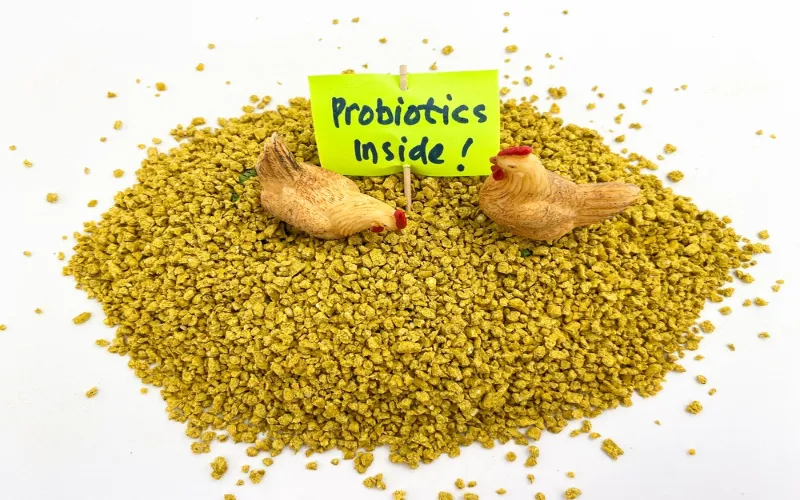The most recent work to study the human microbiome has been to treat disease and understand its effect on human functionality. This is understandable as the microbiome is a new venue of study and could potentially be an incredibly important part of human health that has been overlooked for so many years. However, interestingly, some studies are also branching into other categories of functionality. One such study examines the effect of probiotic supplementation on chicken meat.
The study examined the meat’s flavor and measured the chickens’ growth comparatively. One group was given probiotics through the feed of Issatchenkia orientalis and Bacillus macerans, which significantly affected the chicken’s development.
Probiotic flora might also be a sustainable way of controlling pathogens in chickens rather than indiscriminately using antibiotics (which are heavily used in the poultry industry to promote growth). While this study hardly seems applicable to health, it showed some important facts on the gut microbiome. The diversity of the gut was determined to be influenced by both the environment and genetics. While chickens are quite an offshoot of humans, it shows how the microbiome can significantly influence certain body parts.
With poultry farming evolving into a major industry worldwide, there’s a growing emphasis on ensuring chicken health. Probiotics add flavor to the meat and play a pivotal role in disease control, protecting both chickens and consumers.
Understanding Chicken Diseases and Their Impact
A detailed look into the diseases that predominantly affect chickens, how they spread, and their consequences on poultry farming.
Common Poultry Diseases and Their Symptoms
Chickens can suffer from diseases caused by bacteria, viruses, or parasites. Symptoms range from diarrhea and discharge from the eyes to a drop in egg production and mortality.
The Risk to Human Health
Certain avian diseases, like influenza, pose zoonotic threats – meaning they can be transmitted from birds to humans. Such outbreaks raise health concerns due to potential transmission and symptoms.
Economic Implications for Poultry Farmers
Diseases can lead to significant mortality in flocks, reducing egg production and meat yield and affecting the farm’s profitability.
Probiotics: A Natural Solution for Disease Control
Dive into probiotics and understand how these beneficial bacteria can be a game-changer for poultry farming.
Probiotics and Their Role in Chicken Health
Probiotics, being beneficial bacteria, compete with harmful pathogens in the chicken’s gut, reducing infections and enhancing the bird’s overall health.

Enhancing Flavor through Probiotics
Nutrition plays a part in flavor development. By promoting healthy gut flora, probiotics can indirectly influence the flavor profile of chicken meat.
Prevention Over Treatment
With fewer infections, there’s a reduced need for antibiotics. This makes probiotics a preventive measure, reducing treatment costs and antibiotic residues.
Implementing Biosecurity for Comprehensive Disease Control
While probiotics are a natural solution, complementing them with stringent biosecurity measures ensures a holistic approach to disease prevention.
Setting Up Effective Biosecurity Systems
Keeping poultry areas clean, restricting access, using disinfectants, and controlling rodents and insects are essential to ensure a disease-free environment.
Importance of Sanitation in Poultry Farms
Clean water, feed, litter, regular equipment, coops, and vehicle disinfection are vital in controlling disease spread.
Regular Monitoring and Veterinary Care
Early detection of signs or symptoms of the disease through regular checks and prompt veterinarian intervention can curb disease outbreaks.
Challenges and Future Directions
Understanding potential challenges and looking towards innovative solutions is crucial as the poultry industry evolves.
Balancing Nutrition and Disease Control
Ensuring chickens get proper nutrition while controlling diseases is a delicate balance, requiring continuous research and adaptation.
Educating Farmers and Workers
Imparting knowledge about disease symptoms, prevention, biosecurity, and the benefits of probiotics is essential for the industry’s sustainable growth.
Innovations in Probiotic Formulations
With advancing research, there’s potential for more potent probiotic strains that can offer better disease control and flavor enhancement.
Conclusion
Conclusively, probiotics present a promising flavor enhancement and disease control solution in chickens. Complemented with comprehensive biosecurity measures, it offers a sustainable and health-centric approach to poultry farming, benefiting both farmers and consumers.
FAQs
Do probiotics alter the taste of eggs?
Probiotics can enhance the overall health of chickens, which may influence egg quality, but direct taste alteration is less common.
How do probiotics help in reducing antibiotic use?
By boosting gut health and immunity, probiotics can reduce the onset of diseases, lessening the need for antibiotics.
Is there a specific age to start giving probiotics to chicks?
Probiotics can be introduced early, often within days after hatching, to promote gut health.
Reference
Wang, Y., Sun, J., Zhong, H., Li, N., Xu, H., Zhu, Q., & Liu, Y. (2017, July 25). Effect of probiotics on the meat flavor and gut microbiota of chicken. Retrieved from https://www.nature.com/articles/s41598-017-06677-z#Sec22




